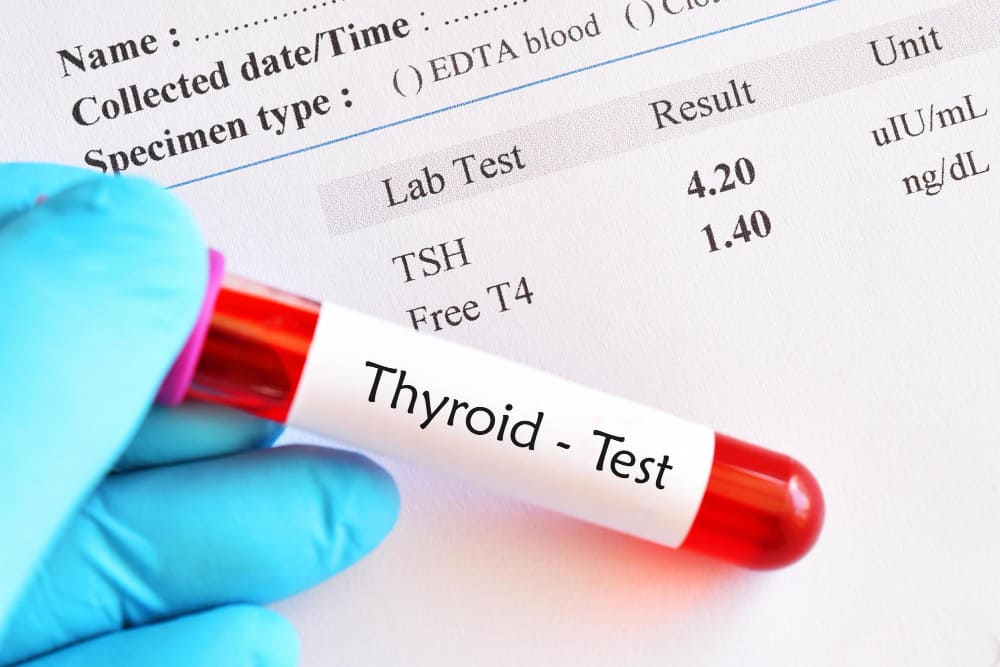Book on Whatsapp
9892101616
Hypothyroidism in India: Symptoms, Causes, and Treatment
Thyroid
Fri Oct 27 2023
Hypothyroidism, often referred to as an underactive thyroid, is a common hormonal disorder affecting millions of people in India. This condition occurs when the thyroid gland does not produce enough thyroid hormones. The thyroid gland plays a crucial role in regulating various bodily functions, including metabolism, energy production, and growth. In this blog post, we will explore the symptoms, causes, and treatment options for hypothyroidism in India.
Symptoms of Hypothyroidism:
Hypothyroidism manifests differently in each individual. While some individuals may experience mild symptoms, others may face more severe indications. Some common symptoms of hypothyroidism include:
1. Fatigue and weakness
2. Weight gain or difficulty losing weight
3. Sensitivity to cold temperatures
4. Dry skin and hair
5. Hair loss
6. Muscle and joint pain
7. Constipation
8. Depression or mood swings
9. Memory problems or brain fog
10. Irregular menstrual periods
These symptoms can significantly impact an individual's quality of life, leading to physical and emotional distress if left untreated.
Causes of Hypothyroidism:
In India, the most common cause of hypothyroidism is an autoimmune condition called Hashimoto's thyroiditis. This occurs when the body's immune system mistakenly attacks the thyroid gland, impairing its ability to produce sufficient hormones. Other causes of hypothyroidism can include:
Know more about: Lifestyle Changes to Improve your Thyroid Condition Detoxification of Liver
1. Iodine deficiency: A lack of dietary iodine, found in iodized salt and certain seafood, can lead to an underactive thyroid.
2. Previous thyroid surgery or radiation treatment: Surgical removal of the thyroid gland or radiation therapy to treat other conditions can damage or impair its function.
3. Medications: Certain medications, such as lithium, amiodarone, and some antithyroid drugs, can interfere with thyroid hormone production.
4. Postpartum thyroiditis: Some women may experience an underactive thyroid after giving birth, which typically resolves within a few months.
Diagnosis Test of Hypothyroidism:
If you experience symptoms of hypothyroidism, it is essential to consult a healthcare professional. Your doctor may perform a physical examination, inquire about your medical history, and order blood tests to measure your thyroid hormone levels. These tests typically include thyroid-stimulating hormone (TSH test), free thyroxine (T4), and in some cases, thyroid antibodies. You can get Thyroid Profile Test from Manipal TRUtest within a few minutes.
Treatment options for hypothyroidism usually involve lifelong hormone replacement therapy. The most commonly prescribed medication is levothyroxine, a synthetic version of the hormone thyroxine. The dosage is determined based on the individual's specific needs, and regular monitoring is crucial to ensure the optimal dosage.
In addition to medication, certain lifestyle modifications can help manage hypothyroidism. These can include:
1. Eating a well-balanced diet: Consuming foods rich in iodine, selenium, and zinc can support thyroid function.
2. Managing stress: Practicing stress-reducing techniques like meditation, yoga, or exercise can support overall well-being.
3. Regular exercise: Engaging in physical activity regularly can help boost metabolism and improve energy levels.
4. Adequate sleep: Prioritizing sufficient sleep can aid in maintaining hormonal balance and overall health.
Hypothyroidism is a prevalent condition in India, affecting numerous individuals. Recognizing the symptoms and seeking early diagnosis and treatment is crucial in managing this condition and improving the quality of life. By working closely with healthcare professionals, individuals with hypothyroidism can effectively manage their symptoms, restore thyroid hormone levels, and lead fulfilling lives.
Furthermore, it is important to raise awareness about hypothyroidism in…
Sinus infections, also known as sinusitis, occur when the sinuses become inflamed and infected. The sinuses are air-filled cavities located around the nose, forehead, and cheeks. Here are some common symptoms of a sinus infection and how to treat it:
Treatment for Hypothyroidism in India:
- Manage symptoms: Over-the-counter pain relievers like ibuprofen or acetaminophen can help relieve pain and reduce inflammation. Nasal sprays or saline irrigation with a neti pot can help clear nasal passages.
- Stay hydrated: Drink plenty of fluids to aid in thinning mucus and to prevent dehydration.
- Steam inhalation: Breathe in warm steam from a shower or a bowl of hot water to help relieve congestion.
- Apply warm compresses: Use a warm compress on your face to alleviate pain and pressure.
- Rest: Get plenty of rest to help your body fight off the infection.
- Use a humidifier: Add moisture to the air with a humidifier to help ease congestion.
- Avoid triggers: Stay away from irritants like smoke and strong chemical odours that can worsen symptoms.
If your symptoms worsen or persist for more than a week, it is advisable to consult a healthcare professional. They may prescribe antibiotics if a bacterial infection is suspected or recommend other treatments based on the severity and underlying cause of your sinus infection.
Frequent health tests and screenings are imperative for senior men to preserve their overall health and detect potentially hidden illnesses at an early stage. The aforementioned tests provide great insights into significant aspects of a senior man’s well-being such as blood sugar levels, cardiovascular health, liver function, immunity function and the presence of conditions like rheumatoid arthritis. Remember, the sooner you get a diagnosis, the earlier you can prevent illnesses.
Manipal TRUtest provides comprehensive diagnostic services backed by 70 years of assured quality and trust. Get Home Sample Collection and a well-qualified phlebotomist shall visit for complete procedure. Test Reports are available to be downloaded online within 24 hours.
Related Blogs

Thyroid
When Should You Be Tested for Thyroid Conditions? Early Signs You Shouldn’t Ignore
Though small and often overlooked, your thyroid gland is a powerhouse when it comes to keeping you balanced. It helps control metabolism, energy levels, heart rate, mood, digestion, and other key body processes. But it isn't always easy to identify when your thyroid is unbalanced; symptoms tend to develop gradually and can be mistaken for aging, stress, life changes, or lifestyle. Knowing when you need a Thyroid Test will allow you to catch issues early enough that they can be treated and not cause long-term health problems.
The hormones your thyroid make help control how every cell in your body works. Just a little imbalance can cause physical fatigue, mental confusion, and emotional instability. So many go undiagnosed for years simply because the signs all feel “normal” or tolerable in the beginning.
Early testing allows you to:
- Identify imbalances before symptoms become severe
- Avoid heart, metabolic, and fertility problems
- Initiate time management and lifestyle changes
Warning Symptoms That You May Have a Thyroid Disorder
Thyroid-related symptoms often appear gradually. If any of the below symptoms seem to be consistent, then it might be time to do a Thyroid Profile Test.
- Chronic Fatigue and Low Energy: If you are sleeping enough, but constantly feeling tired, this is one of the biggest symptoms of a thyroid imbalance. A sluggish thyroid can drag your metabolism and energy levels down with it.
- Weight Changes: In the case of hypothyroidism, some individuals notice unusual weight gain without modifying their diet or activity habits. On the other hand, unexplained weight loss may indicate hyperthyroidism.
- Hair Loss, Dry Skin, Weak Nails: While losing hair doesn't seem like it's a big deal (other than it being devastating to those diagnosed), or dry and brittle nails may appear inconsequential on the surface, they are pretty major red flags that can suggest an issue with your thyroid hormone levels.
- Mood Swings or Anxiety and Depression: As your brain activity slows due to low levels of thyroid hormones, you might be experiencing the blues as well or tend toward anxiety.
- Irregular Menstruation and Infertility: Low thyroid function can also lead to missed or heavy periods, as well as irregular menstrual cycles, in both men and women.
Who Should Consider Regular Thyroid Testing?
You may need a Thyroid Test if you:
- Have a family history of thyroid disease
- Are pregnant or planning to become pregnant
- Have autoimmune conditions such as diabetes or PCOS
- Experience persistent, unexplained symptoms
- Are between 30–35 years old and have never been tested
Many people at higher risk are encouraged to get regular screenings—even without obvious symptoms.
What Does a Thyroid Profile Test Include?
A Thyroid Profile Test measures vital hormones like TSH, T3, and T4 to assess how efficiently your thyroid is functioning. Rather than relying solely on symptoms , this test provides accurate insights to help doctors diagnose thyroid issues and create effective treatment plans.
How Early Testing Matters
However, thyroid disease is highly treatable if diagnosed early. Late diagnosis can lead to complications, including heart problems, continued tiredness, and weight management or reproductive health issues. It’s crucial to know what the early signs are and that you get tested on time so your general health is closer to par.
Paying attention to our bodies and seeing our chronic warning signals is of paramount importance. If you have these signs and they haven’t resolved or are impacting the quality of your life, then a simple Thyroid Profile Test could provide some peace of mind. With the right diagnosis and treatment, it’s much easier to keep your thyroid healthy — and you can get on with living life.

Thyroid
Thyroid Problems Peak in Winter: Why TSH, T3, T4 Testing Is Essential
Winter brings with it a marked change in lifestyle, food, and physiological activities. Though this season is enthusiastically awaited because of the pleasant stimulating effect of the cold breeze and fun-filled environment, it can quietly worsen a medical condition in a majority of people, thyroid dysfunction being foremost among them. Observations have proved that thyroid ailments, especially hypothyroidism, reach their peak during this time of the year, thus emphasizing the need for proper thyroid function tests, T3, and T4 during this time.
The thyroid functions to regulate metabolism, temperature, energy, and hormones in a human being. During winter, the energy requirements in a human being change, considering the need to maintain warmth in the body. The thyroid gland will have to work extra hard during this time. Furthermore, a weakened thyroid in an individual will experience worsened hormonal imbalances. A lower amount of sun exposure, reduced levels of vitamin D, and an imbalance in circadian rhythms impact thyroid dysfunction.
Hypothyroidism, a sickness where the thyroid glands are not able to produce sufficient hormones, is especially common during the winter months. Symptoms include tiredness, a gain in weight, a lack of elasticity in the skin, thinner hair, depression, and being overly sensitive to cold, all of which are normally associated with winter fatigue but end up being mistaken for it. As a consequence, most people suffer needlessly before being tested because of this sickness, making thyroid function tests absolutely vital in this case.
TSH Test
The main screening tool for thyroid dysfunction is called TSH, which stands for Thyroid-Stimulating Hormone Test. TSH measures "how strongly a patient's pituitary gland is stimulating their thyroid to make hormones." When TSH levels become higher than normal, this can indicate an underactive thyroid, but lower levels can be an indication of hyperthyroidism. However, TSH tests by themselves don't provide a full diagnosis.
T3 (Triiodothyronine) and T4 (Thyroxine) tests assess the true level of thyroid hormones in the blood serum. T4 is referred to as a main hormone produced in the thyroid gland, while T3 is called a metabolically active hormone with a direct influence on metabolism. Assessment of T3 and T4 levels along with TSH measurements will help doctors to clearly establish the type and level of thyroid organ dysfunction in patients with symptoms not so different from those with seasonal fatigue.
Women, people over 30 years of age, expecting mothers, and those with a history of thyroid problems in their families need to have thyroid function tests performed on them. Untreated thyroid disorders can cause serious side effects such as infertility, menstrual disorders, cardiovascular diseases, intellectual disability, and an impaired immune system. Blood tests will help in the early identification of any thyroid imbalance and thus prevent serious consequences.
Moreover, during this time of the year, people indulge in food and are not very active physically. Such factors can influence treatment in patients with thyroid diseases. doctors can monitor thyroid levels in order to adjust medicines if necessary.
Conclusion
As a closing statement, winter is not only a season of discontent but is also a very important time when thyroid function matters a lot. Due to the subtle nature of thyroid symptoms, it is important to go for tests without fail. TSH, T3, and T4 tests can be of immense importance in understanding thyroid function and can thus help in coping with it effectively.
This winter and New Year season, don’t let thyroid issues go unnoticed. Manipal TRUtest offers accurate thyroid profile testing, preventive health packages, and convenient home sample collection services.
Start the New Year with balance and confidence—book your thyroid tests today and take charge of your health.

Thyroid
Role of Advanced Diagnostic Tests in Thyroid Cancer Detection
Thyroid cancer is one of the most common endocrine malignancies, and its incidence has been steadily increasing worldwide. Although many thyroid cancers progress slowly, early detection is crucial to ensure effective treatment and improved survival rates. Traditionally, physical examination and basic imaging were the primary methods for identifying thyroid abnormalities. However, with advancements in medical technology, modern diagnostic tests have significantly enhanced the accuracy of thyroid cancer detection. These advanced tools not only help in early diagnosis but also guide treatment decisions and reduce the risk of unnecessary interventions.
Ultrasound Imaging
High-resolution ultrasound is the first-line diagnostic tool for evaluating thyroid nodules. It provides detailed information about the size, shape, and texture of nodules. Features such as irregular margins, microcalcifications, and hypoechogenicity can indicate a higher risk of malignancy. Doppler ultrasound further assists by evaluating blood flow patterns, improving differentiation between benign and malignant nodules.
Fine-Needle Aspiration Biopsy (FNAB)
FNAB remains the gold standard for diagnosing thyroid cancer. Under ultrasound guidance, a thin needle is used to collect cells from suspicious nodules. These samples are then examined under a microscope to determine if cancerous changes are present. Although highly reliable, FNAB sometimes yields indeterminate results, which has prompted the development of additional molecular and genetic testing.
Molecular and Genetic Testing
One of the most significant advancements in thyroid cancer detection is the use of molecular diagnostics. Tests that analyze genetic mutations, such as BRAF, RAS, RET/PTC, and PAX8/PPARγ, help improve diagnostic accuracy when FNAB results are inconclusive. Identifying these mutations not only aids in diagnosis but also provides insights into the aggressiveness of the cancer and helps tailor targeted therapies.
Thyroglobulin Testing
Thyroglobulin is a protein produced by the thyroid gland. While it is not used as an initial diagnostic tool, it plays a vital role in monitoring patients after thyroid cancer treatment. Elevated levels of thyroglobulin in patients who have undergone thyroid removal may suggest cancer recurrence.
Radionuclide Scans
Nuclear medicine imaging, particularly using radioactive iodine (I-123 or I-131), is valuable for assessing thyroid function and detecting cancer spread. These scans help determine whether a thyroid nodule is “hot” (overactive and usually benign) or “cold” (underactive and potentially malignant). Post-treatment scans are also essential for monitoring residual thyroid tissue or metastasis.
Positron Emission Tomography (PET) Scans
PET scans, often combined with CT, are used in advanced cases where other tests may not clearly detect cancer spread. They are particularly useful in patients with aggressive thyroid cancers or when standard radioactive iodine scans are negative. PET scans provide a whole-body overview, allowing for comprehensive staging of the disease.
The Importance of Early and Accurate Diagnosis
Advancements in diagnostic technology have transformed thyroid cancer management. Early and precise detection ensures patients receive the most suitable treatment—whether surgery, radioactive iodine therapy, or targeted molecular approaches—while avoiding unnecessary interventions in benign cases.
From high-resolution imaging and FNAB to molecular testing and PET-CT scans, these innovations enable doctors to diagnose with greater confidence and tailor treatments for the best outcomes.
Your Partner in Accurate Thyroid Diagnostics – Manipal TRUtest
At Manipal TRUtest Diagnostics, we combine advanced imaging with cutting-edge molecular and pathology testing to ensure precise thyroid cancer detection and monitoring. Our state-of-the-art facilities and expert teams help detect abnormalities early, enabling timely treatment and better recovery outcomes.
Book your Thyroid Profile or Cancer Marker Test today at your nearest Manipal TRUtest center and take a proactive step toward safeguarding your health.
